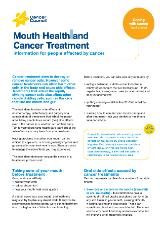- Home
- About Cancer
- Managing side effects
- Mouth health and cancer treatment
- Oral mucositis and saliva changes
Oral mucositis and saliva changes
Oral mucositis and a dry mouth are considered more severe side effects of cancer treatment.
Learn more about:
Oral mucositis
Radiation therapy to the head or neck area, some chemotherapy and targeted therapy drugs, or high-dose chemotherapy before a stem cell transplant can damage the cells lining the mouth. This is known as oral mucositis. Being treated with both chemotherapy and radiation therapy (chemoradiation) increases the risk.
Symptoms include:
- painful spots, sores or ulcers in your mouth
- bleeding in the mouth
- mouth infections such as oral thrush
- difficulty and pain with eating, swallowing or wearing dentures
- sensitivity to hot, cold, salty, spicy or acidic foods and drinks.
Your doctor can give you medicines to reduce the discomfort when you eat, drink or speak. Some medicines can be applied directly to the mouth sores to numb them. Mucositis usually gets better a few weeks or months after treatment ends.
Dry mouth and saliva changes
Radiation therapy or surgery to the head or neck area, some chemotherapy drugs and some pain medicines can reduce the amount of saliva (spit) in your mouth, make your mouth dry or make your saliva thick and sticky. This is known as xerostomia.
Symptoms include:
- not having as much saliva as usual
- thick or stringy saliva
- a sticky or dry feeling in your mouth
- problems chewing, tasting and swallowing
- finding it hard to speak (the tongue may have trouble moving)
- ridges or cracks on the tongue surface or the corners of the mouth
- difficulty with swallowing saliva or spitting it out.
Thick, sticky saliva or a dry mouth can make it harder to keep your teeth and mouth clean, which can increase the risk of tooth decay and mouth infections such as oral thrush. Thick saliva tends to improve in the weeks after treatment. Dry mouth from radiation therapy to the head and neck area can last for many months after treatment. For some people, it can be permanent.
Listen to our podcast on Appetite Loss and Nausea
More resources
A/Prof Sharon Liberali, Specialist, Special Needs Dentistry, and Director Special Needs Unit, Adelaide Dental Hospital, SA Dental Service, SA; Cecilia Barling, Consumer; Dr Bena Brown, Principal Allied Health Research Fellow in Cancer, and Advanced Speech Pathologist (Oncology), Princess Alexandra Hospital and Centre for Functioning and Health Research, QLD; Lisa Castle-Burns, Head and Neck Cancer Specialist Nurse, Canberra Region Cancer Centre, Canberra Hospital, ACT; Merran Findlay, Executive Research Lead – Cancer Nutrition, Oncology Specialist Dietitian, Royal Prince Alfred Hospital, NSW; Jasmin Mazis, 13 11 20 Consultant, Cancer Council SA; Rick Pointon, Consumer; Prof David Wiesenfeld, Oral and Maxillofacial Surgeon, and Director, Head and Neck Tumour Stream, The Victorian Comprehensive Cancer Centre, VIC; Dr Sue-Ching Yeoh, Oral Medicine Specialist, Sydney Oral Medicine, Royal Prince Alfred Hospital and Chris O’Brien Lifehouse, NSW
View the Cancer Council NSW editorial policy.
View all publications or call 13 11 20 for free printed copies.
Need to talk?
Support services
Coping with cancer?
Speak to a health professional or to someone who has been there, or find a support group or forum
Cancer Council Online Community
A community forum – a safe place to share stories, get tips and connect with people who understand
Cancer information
Cancer treatment
Learn more about common cancer treatments such as surgery, chemotherapy and radiation therapy and other less common treatments such as immunotherapy and targeted therapy
What is cancer?
How cancer starts and spreads

